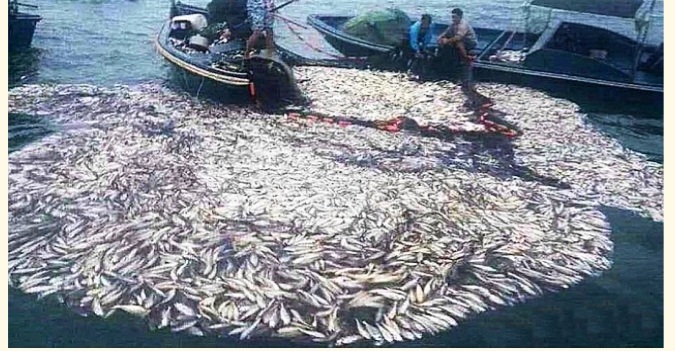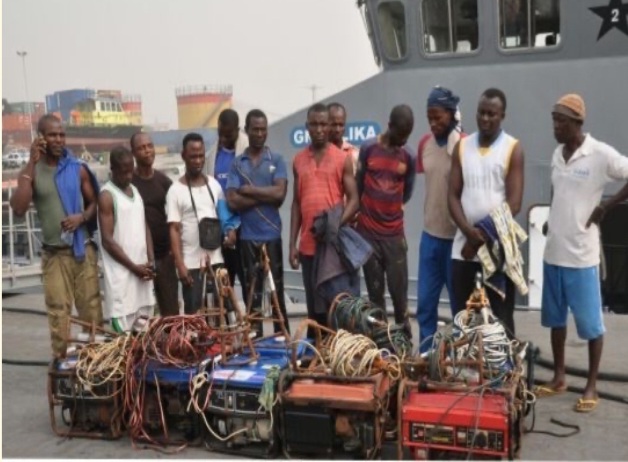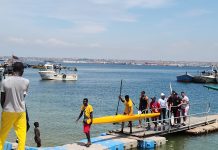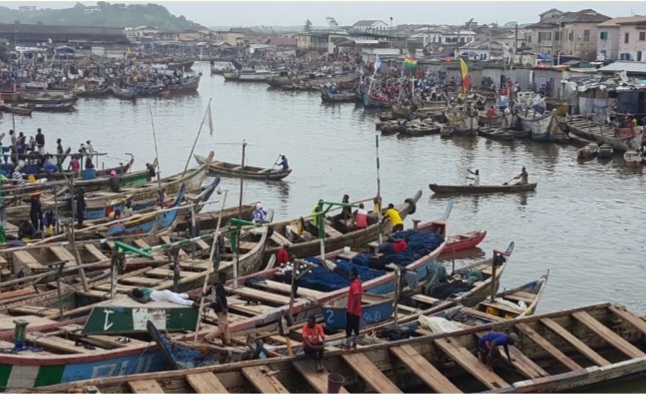Photo Credit: The Ghana Report….Increased Canoe On Seas
Author: Edith Debrah
The Ministry of Fisheries and Aquaculture Development in September imposed a three-year moratorium on new entrants of canoes in the marine sector.
According to the sector minister, Mavis Hawa Koomson, the move is part of measures to address the issue of dwindling fish stock in the country.
The moratorium on the new artisanal canoe entrants will take effect from October 1, 2023 and last three years. This means no canoes will be constructed and brought into the system for the next three years.
With this measure, it is expected that the pressure on the fisheries resources, in addition to the other measures the government is implementing, will all contribute to a reduction of the pressure on fisheries resources.
Therefore, one can say the moratorium came at a good time. However, we still do not fully understand the full impact of fishing boats on marine life.
At a global level, institutions such as the United Nations’ Food and Agriculture Organization have invested a significant amount of time and effort into broadening knowledge on fishing fleets.
The organization wished to reduce this knowledge gap; hence, it collected information on fishing fleets of (almost) all countries with access to the sea and formulated a mathematical analysis to fill in the gaps.
In Ghana, under the existing open access system, the number of canoes has risen from 8,000 in 1990 to more than 12,000 in 2023. Talk less of the quality of fish they catch.
Over the years, the small pelagic fish landings, which is the backbone of the artisanal sub sector, has decreased from 119,000 metric tons in 1990 to 20,000 metric tons in 2022.
The annual landings of the Sardinella Aurita also declined from 119,515 tons in 1992 to 11,834 tons in 2019, representing 9.9% of its largest recorded landings.
To a large portion of the world’s population, marine fishing is the way to maintain their way of life, from diet, to cultural or employment perspective.
We cannot however separate the action of fishing from one of its basic technical elements – the fishing boat. What is considered artisanal today is more ‘powerful’ than what was considered artisanal 50 years ago, when I was not born.
The traditional fishing boat decades ago was just made of wood and a paddle with its minimum length used by fishermen was just 12 feet or less but now, these boats have maximum length being 22 feet, twice what was used 50 years ago, including engine-powered motors which represent the majority of boats in numbers becoming more efficient and the pressure that fishing fleets puts on the ocean ,increased.
A Marine Stewardship Council search concluded that, more fishing vessels have become motorised compared to decades ago, where motors powered only 20 percent of the global fishing fleet in 1950. This number rose to 68 percent in 2015.
However, the ballooning fishing fleet is catching less seafood for the same effort, from a research report in a new study published in the Proceedings of the National Academy of Sciences.
IUU causing climate change in the sea
Illegal fishing typically refers to fishing that breaks local or international laws as set by fishing management bodies. It can include fishing without a licence or permit, fishing in a closed-off area, fishing with prohibited gear, the use of cyanide or explosives to catch fish.
Overfishing
Someone may ask; how is it overfishing if I catch more than I need to make extra cash? But do you think of what you are catching? Is it a fingerling or the fully matured fish?
Overfishing occurs when too many fish in a particular stock are caught and there are no enough adults to breed and sustain a healthy population.
The level of overfishing has been increasing in recent decades and the number of overfished stocks is now three times higher than in 1970.
The United Nations Food and Agriculture Organization monitors over 500 fish stocks around the globe. In 2022, it is estimated that over 35% of these fish stocks were overfished.
For communities reliant on fishing, the impact of stock collapses can be devastating. Therefore, it has become a concern for the wild marine environment, as it is one of the major causes of the loss of ocean biodiversity.

Ghana: undercover video reveals shocking scale of fish discards (video on YouTube)
The explosives
Explosives like dynamite are used to stun and kill fish so they float to the surface and be easily scooped up by nets. These destructive fishing practices result in irreversible damage to habitats and the ecosystems.
Measures have been put in place to help fight illegal, unreported and unregulated (IUU) fishing but, unfortunately, these measures have not been enough in dealing with the canker as the fishing fleet is becoming more prominent and more powerful.
Not forgetting the popular technique – light fishing used in Ghana
According to Geronimo R. Rosario, this is a type of fishing aid where fishermen use lights in their fishing gear to attract the target species. Growing up, I noticed a trend of insects crowd around light bulbs after it rains, putting me in the belief that truly light attracts.

Some fishermen caught for engaging in the practice of using light to fish [Photo credit: Prime News Ghana]
Therefore, there has been a worldwide reduction in the efficiency of fishing activities. We are spending more time at sea than we used to but, comparatively, we are catching less.
This situation could become a problem as many people over three million Ghanaians rely on fish simply to survive.
Ask yourself these questions and reflect on them
There are questions we need to ask. For instance, what will we do if the fishing industry collapses?
What happens to that fisherman whose livelihood depends solely on fish, if there are no more resources in the sea?
What happens to that mother who sells fish to cater for her family and the over three million Ghanaians who depend solely on the sea for their livelihood, because they have no alternative livelihood?
After careful consideration
At this rate, fisheries management will need to take drastic measures at the local, national, and international levels to ensure that we maintain our impact on the oceans at sustainable levels. Some of these shifts in management are already being observed.
Nevertheless, no matter how long it will take, the change needs to be widespread to ensure that we keep having access to oceans’ resources for the future generation and us.
The moratorium is just one of the major interventions by government for the recovery of depleting marine fisheries stock for three years. Its implementation would be reviewed annually. This means that no canoes will be constructed and brought into the system for the next three years.
With this measure, it is expected that the pressure on fisheries resources, in addition to the other measures the government is implementing, will all contribute to a reduction of the pressure on our fisheries resource to recover the over-exploited small pelagic stock.
But what if there is a possibility that the pelagic have left their original habitat to a different habitat due to the Illegal, unreported, and unregulated (IUU) practices and increase in ocean temperatures has changed the migratory routes of fish stocks, causing them to move away from traditional fishing grounds? That could be a possibility.
What if all the Chinese trawlers in Ghana are banned and our fishermen go beyond their traditional fishing border on the sea, and fish close to where the trawlers fish? Don’t we think we would catch the small pelagic the trawlers catch illegally, and later discard in the sea?








































